Search Results
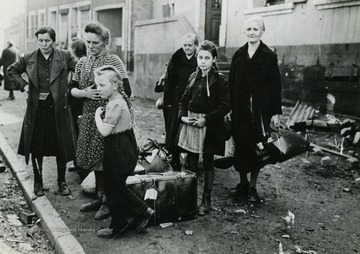
- IDNO:
- 041197
- Title:
- German Civilians Evacuated From Battle Area, Schaffhausen, Germany
- Date:
- ca. 1945
- Description:
- Information on back of photo reads: "German civilians are rounded up for evacuation from Schaffhausen, occupied by Seventh U.S. Army troops March 14, 1945. The German town, six miles north of the frontier of Alsace, is under constant enemy shellfire."
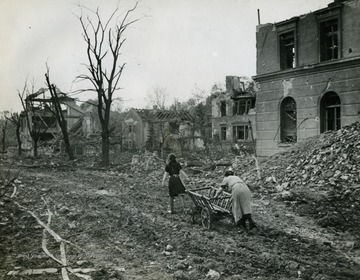
- IDNO:
- 041198
- Title:
- German Refugees Move Through Ruins of Regensburg, Germany
- Date:
- ca. 1945
- Description:
- Information on back of photo reads: "German refugees with a cart move through the ruins of bombed Regensburg, captured by the 65th Division of the Third U.S. Army April 23, 1945. General George Patton's Third Army struck into the Southern German segment from the northwest to capture the Danube River town, which is about 70 miles from Munich."
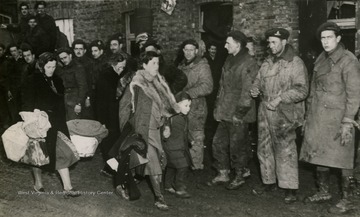
- IDNO:
- 041199
- Title:
- Humiliated German Women Pass Through Canadian Lines to Evacuation Center
- Date:
- ca. 1945
- Description:
- Information on back of photo reads: "Shame, guilt, and humiliation cloud the faces of these German women as they pass through the Canadian lines to an evacuation centre. They put guns before butter in the years between the wars; they lived on the loot of conquered Europe, and clothed themselves in furs from Russia and fine clothes from Paris. Now it is their turn to be homeless, and the watching troops, who saw grim evidence of German ruthlessness in the countries they liberated, show no sympathy."
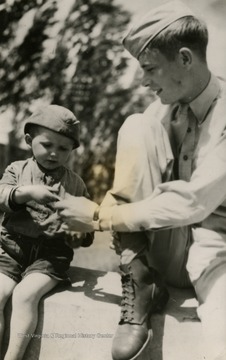
- IDNO:
- 041200
- Title:
- U.S. Soldier Introduced Russian Lad to Chewing Gum
- Date:
- ca. 1945
- Description:
- Information on back of the photo reads: "Puzzled but curious, a little Russian boy accepts a stick of chewing gum from his new friend, a U.S. Air Forces solider at the Russian terminus of Italy-Russia shuttle missions flown by heavy bombers of the U.S. Fifteenth Army Air Force. Since June, 1944, Allied bombers from England and Italy, escorted by fighters, have flown to bases in Russia, and return, attacking enemy targets in occupied Europe en route."
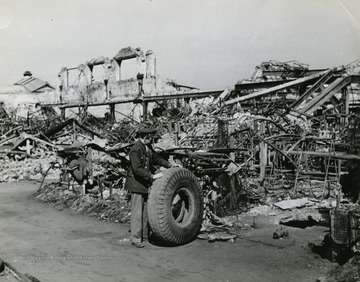
- IDNO:
- 041201
- Title:
- Hanau Dunlop Rubber Plant Gutted, Hanau, Germany
- Date:
- ca. 1945
- Description:
- Information on back of photo reads: "If German divisions no longer retreat according to plan, part of their difficulties can be traced to the destruction of Deutsche Dunlop A.G. tire and rubber factory at Hanau, Germany, east of Frankfurt - a priority - one target for R.A.F. and the U.S. Eighth Air Force. When American Air Force observers surveyed the second most important rubber plant on the Continent, they found ruin and destruction widespread. Despite this the enemy's need for rubber products is so great, there was evidence of clearance and repair work to restore partial production, said surveyors. Elsewhere in Hanau the locomotive roundhouse had been destroyed by Allied air attacks. The town's gas works was a shambles. in the marshalling yard sidings and through lines were pocketed with bomb craters, some filled - in attempts to keep the rails open. In one typical Hanau attack last December, the Eighth sent 303 heavy bombers to drop in one-ton (U.S.) bombs, 1,112 one-thousand pounders, 176 five-hundreds, and 3,420 hundred-pound bombs."
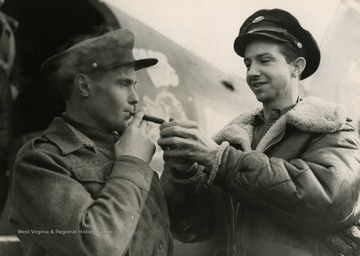
- IDNO:
- 041202
- Title:
- U.S. Army Celebrates Red Army Day With Russians
- Date:
- 1945/02/25
- Description:
- Information on back of photo reads: "American Sergeant Vivian L. Rees of Wingfield, Iowa, lights the cigar of Soviet Lieutenant Sergi Biernikov during the visit Red Army Day February 25, 1945, to liberated Soviet prisoners of war by U.S. Army Air Forces personnel who had served in the U.S.S.R. The American airmen collected tobacco and candy at their base in England as a gift to the Russians, also stationed in the British Isles."

- IDNO:
- 041203
- Title:
- Third U.S. Army Troops Go Aboard LCVP, Nierstein, Germany
- Date:
- ca. 1945
- Description:
- Information on back of photo reads: "3rd U.S. Army Troops go aboard LCVP prior to first crossing of the Rhine River by soldiers of the 3rd Army at Nierstein, Germany. Soldiers are members of the 5th Infantry Division."
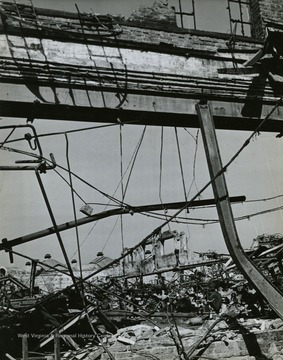
- IDNO:
- 041204
- Title:
- Hanau Dunlop Rubber Plant Gutted, Hanau, Germany
- Date:
- ca. 1945
- Description:
- Information on back of photo reads: "If German divisions no longer retreat according to plan, part of their difficulties can be traced to the destruction of Deutsche Dunlop A.G. tire and rubber factory at Hanau, Germany, east of Frankfurt - a priority - one target for R.A.F. and the U.S. Eighth Air Force. When American Air Force observers surveyed the second most important rubber plant on the Continent, they found ruin and destruction widespread. Despite this the enemy's need for rubber products is so great, there was evidence of clearance and repair work to restore partial production, said surveyors. Elsewhere in Hanau the locomotive roundhouse had been destroyed by Allied air attacks. The town's gas works was a shambles. in the marshalling yard sidings and through lines were pocketed with bomb craters, some filled - in attempts to keep the rails open. In one typical Hanau attack last December, the Eighth sent 303 heavy bombers to drop in one-ton (U.S.) bombs, 1,112 one-thousand pounders, 176 five-hundreds, and 3,420 hundred-pound bombs."

- IDNO:
- 041205
- Title:
- Bastion of Hitler's Eastern Front Falls, Ukraine
- Date:
- ca. 1945
- Description:
- Information on back of photo reads: "Tarnopal, bastion of Hitler's eastern front, turns a scarred face to the camera after its fall with its 12,000 man garrison to Soviet troops. Fighting in and around Tarnopol was prolonged and bitter, and German losses in men and material were heavy."
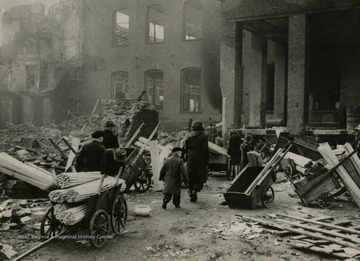
- IDNO:
- 041206
- Title:
- Civilians Gather Firewood in Munchen-Gladbach, Germany
- Date:
- ca. 1945
- Description:
- Information on back of photo reads: "Civilians who have returned to captured, war-torn Munchen-Gladbach fill carts with sticks for firewood outside a bomb-shattered broom factory. Munchen-Gladbach, first big industrial city in the Ruhr area to fall to advancing American forces, was taken March 1, 1945, by troops of the Ninth U.S. Army after heavy air and artillery bombardment. It is 10 miles from the Dutch border."
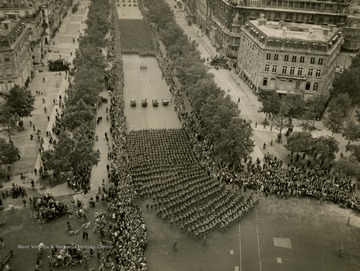
- IDNO:
- 041207
- Title:
- Parisians Line Champs Elysees to Cheer American Army, Paris, France
- Date:
- ca. 1945
- Description:
- Information on back of photo reads: "Parisians line the Champs Elysees to cheer the massed infantry units of the American Army as they march in review towards the Arc De Triomphe, celebrating the liberation of the capital of France from Nazi occupation."

- IDNO:
- 041208
- Title:
- Sergeant Raymond Young of Oak Hill, W. Va. at Work
- Date:
- ca. 1955











